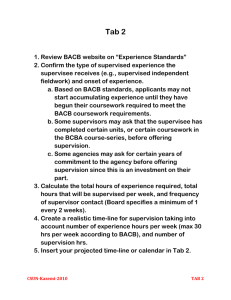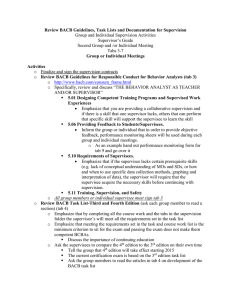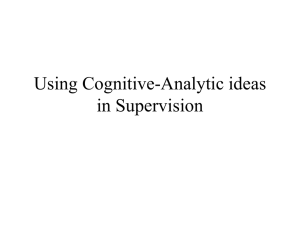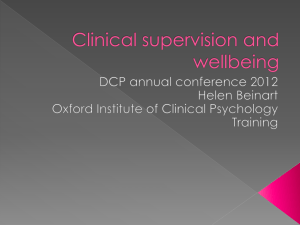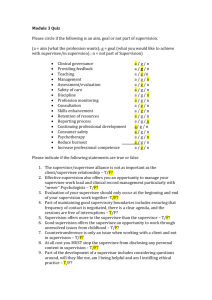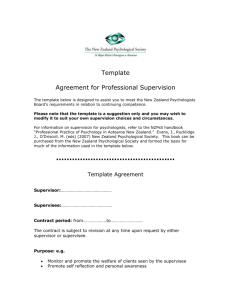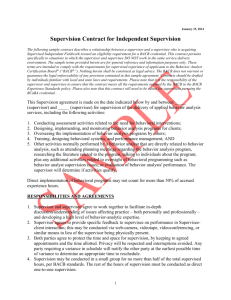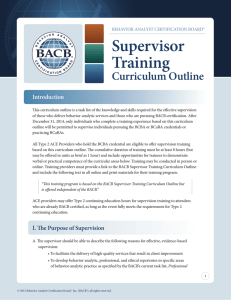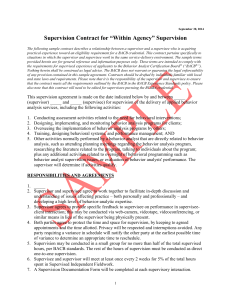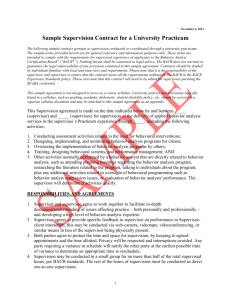Behavior Analysis Supervision Contract | BACB Compliance
advertisement
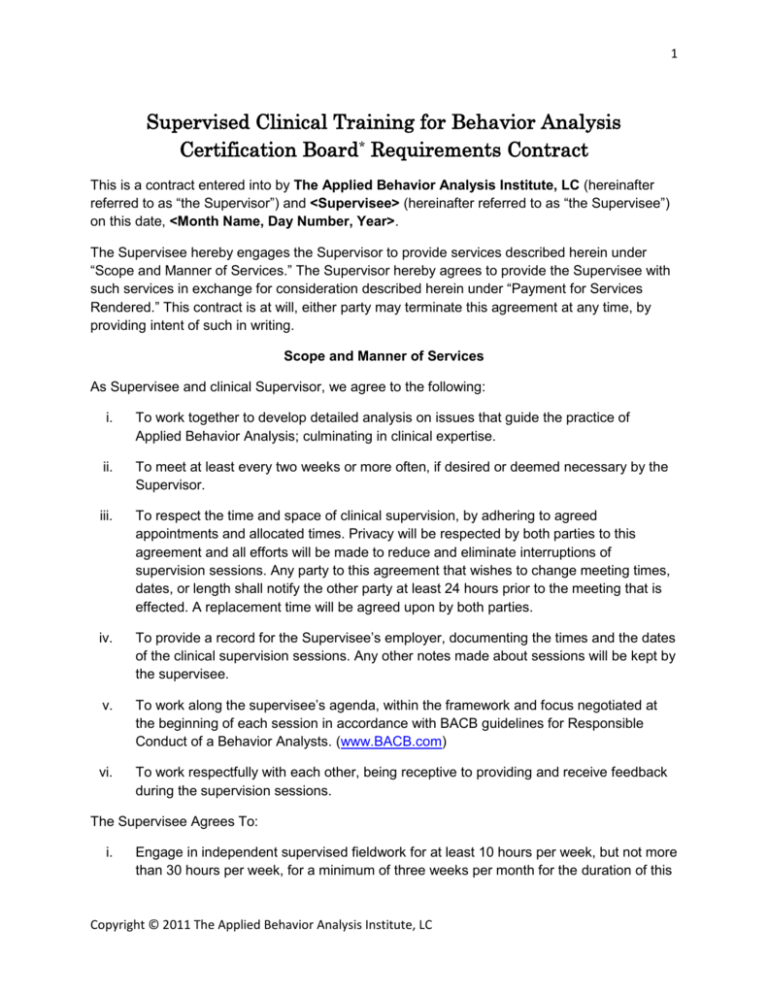
1 Supervised Clinical Training for Behavior Analysis Certification Board* Requirements Contract This is a contract entered into by The Applied Behavior Analysis Institute, LC (hereinafter referred to as “the Supervisor”) and <Supervisee> (hereinafter referred to as “the Supervisee”) on this date, <Month Name, Day Number, Year>. The Supervisee hereby engages the Supervisor to provide services described herein under “Scope and Manner of Services.” The Supervisor hereby agrees to provide the Supervisee with such services in exchange for consideration described herein under “Payment for Services Rendered.” This contract is at will, either party may terminate this agreement at any time, by providing intent of such in writing. Scope and Manner of Services As Supervisee and clinical Supervisor, we agree to the following: i. To work together to develop detailed analysis on issues that guide the practice of Applied Behavior Analysis; culminating in clinical expertise. ii. To meet at least every two weeks or more often, if desired or deemed necessary by the Supervisor. iii. To respect the time and space of clinical supervision, by adhering to agreed appointments and allocated times. Privacy will be respected by both parties to this agreement and all efforts will be made to reduce and eliminate interruptions of supervision sessions. Any party to this agreement that wishes to change meeting times, dates, or length shall notify the other party at least 24 hours prior to the meeting that is effected. A replacement time will be agreed upon by both parties. iv. To provide a record for the Supervisee’s employer, documenting the times and the dates of the clinical supervision sessions. Any other notes made about sessions will be kept by the supervisee. v. To work along the supervisee’s agenda, within the framework and focus negotiated at the beginning of each session in accordance with BACB guidelines for Responsible Conduct of a Behavior Analysts. (www.BACB.com) vi. To work respectfully with each other, being receptive to providing and receive feedback during the supervision sessions. The Supervisee Agrees To: i. Engage in independent supervised fieldwork for at least 10 hours per week, but not more than 30 hours per week, for a minimum of three weeks per month for the duration of this Copyright © 2011 The Applied Behavior Analysis Institute, LC 2 contract. This does not preclude working more than 30 hours per week, but only 30 of the hours worked per week are counted towards the required 1,500 hours. ii. Prepare for sessions, for example, by having an agenda, preparing notes, having completed any reading assignments, or otherwise be prepared to speak on relevant topics. iii. Take responsibility for any outcomes and actions they may take as a result of clinical supervision. iv. Be willing to learn and develop clinical skills while supported in challenging environments. The Clinical Supervisor Agrees To: i. Keep all information revealed in supervision sessions confidential and to maintain the highest degree of confidentiality of all matters and material discussed in supervision sessions. with the following exception: a. Should the Supervisee describe any unsafe, unethical, or illegal practice that they are unwilling to report to the appropriate authorities. In the event that confidentiality must be broken the Supervisee will be notified in advance and in writing by the Supervisor. ii. Protect all of the Supervisees records and secure all documents generated in connection with all clinical supervision sessions. iii. Maintain a commitment to continuous professional development. iv. Insure that the following BACB requirements are met: a. “To qualify under this standard, you must complete 1500 hours of Supervised Independent Fieldwork in Behavior Analysis. The distribution requirement for Supervised Independent Fieldwork hours is not less than 10 hours but not more than 30 hours per week for a minimum of 3 weeks per month.” (www.BACB.com) b. “You may not start accumulating Supervised Independent Fieldwork, Practicum or Intensive Practicum hours until you have started attending courses required to meet the BACB coursework requirements.” (www.BACB.com) c. “During experience hours, your primary focus should be on learning new behavior analytic skills related to the BACB Third Edition Task List. Activities must adhere to the dimensions of applied behavior analysis identified by Baer, Wolf and Risley (1968) in the article Some Current Dimensions of Applied Behavior Analysis published in the Journal of Applied Behavior Analysis.” (www.BACB.com) Copyright © 2011 The Applied Behavior Analysis Institute, LC 3 d. “Appropriate experience activities include: i. Conducting assessment activities related to the need for behavioral interventions, ii. Designing, implementing and monitoring behavior analysis programs for clients, iii. Overseeing the implementation of behavior analysis programs by others, iv. Other activities normally performed by a behavior analyst that are directly related to behavior analysis such as attending planning meetings regarding the behavior analysis program, researching the literature related to the program, talking to individuals about the program; plus any additional activities related to oversight of behavioral programming such as behavior analyst supervision issues, or evaluation of behavior analysts’ performance. Your supervisor will determine if activities qualify. v. Examples of activities that are not appropriate as experience activities include: attending meetings with little or no behavior analytic content, providing interventions that are not based in behavior analysis, doing nonbehavior analytic administrative activities, or any other activities that are not directly related to behavior analysis.” (www.BACB.com) e. “Clients may be any persons for whom behavior analysis services are appropriate. However, you may not be related to the client or the client’s primary caretaker or be the client’s primary caretaker. You must work with multiple clients during the experience period.” (www.BACB.com) f. “The supervisor must observe you engaging in behavior analytic activities with a client in the natural environment during each required supervisory period (i.e., 1 or 2 weeks, depending on the type of experience being obtained). This observation may be conducted via web-cameras, videotape, videoconferencing, or similar means in lieu of the supervisor being physically present. Supervision may be conducted in small groups of 10 or fewer participants for no more than half of the total supervised hours in each supervisory period. The remainder of the total supervision hours in each supervisory period must consist of direct oneto-one contact.” (www.BACB.com) Payment for Services Rendered The Supervisee shall pay the Supervisor for supervised clinical fieldwork, within 25 calendar days of the date on any invoice for services rendered by the Supervisor. Copyright © 2011 The Applied Behavior Analysis Institute, LC 4 Should the Supervisee fail to pay the Supervisor the full amount specified in any invoice within 26 calendar days of the invoice’s date, a late fee equal to $25.00 shall be added to the amount due. In addition, supervision will be terminated until any delinquencies are paid in full. Applicable Law This contract shall be governed by the laws of the County of Clark in the State of Nevada and any applicable Federal law. Signatures In witness of their agreement to the terms above, the parties or their authorized agents hereby affix their signatures: ____________________________________ (Printed Name of Supervisee) _________________________________ (Printed Name of Supervisor) ____________________________________ (Signature of Supervisee) (Date) _________________________________ (Signature of Supervisor) (Date) __________________________ * The trademarks: Behavior Analyst Certification Board, Inc., BACB, Board Certified Behavior Analyst, and BCaBA are owned by the Behavior Analyst Certification Board. The Applied Behavior Analysis Institute, LC in not connected with the Behavior Analyst Certification Board in any way; and does not purport to be so connected. Copyright © 2011 The Applied Behavior Analysis Institute, LC
